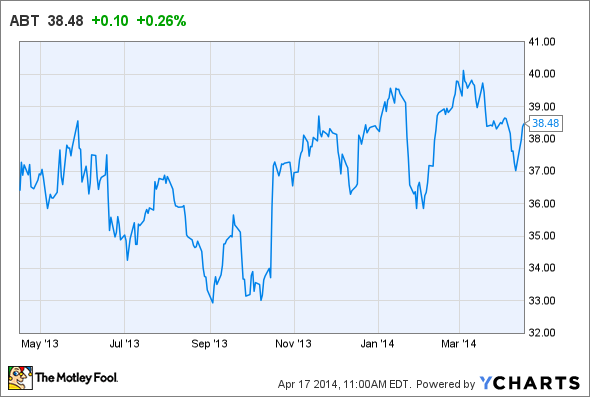Sales across Abbott Labs' (ABT +1.03%) four major business units grew less than 1% last quarter versus the same period a year ago. When including currency conversion headwinds, sales actually fell -2.5% in the past year. However, investors may want to look beyond that top-line performance given it doesn't tell the whole story.
Sales growth for Abbott's medical devices and diagnostics products were solid, particularly overseas. Combined with improving margins, that helped Abbott post earnings of $0.41 in the quarter, above its previous guidance of $0.34 to $0.36 per share.
Additionally, Abbott estimates an August recall in Asia and a planned plant shutdown for its established pharma business last quarter shaved 2.6% off its international growth. Since both those events are behind the company, the first-quarter sales may not be a good indicator for Abbott's full-year potential. Given all the moving pieces, let look more closely at Abbott's results.
A recall stymies sales
Abbott's biggest business is nutrition, where it competes against Mead Johnson (MJN +0.00%). That business represented $1.6 billion of Abbott's $5.2 billion in first-quarter sales, so the impact from a recall last August had an outsized impact on the company's overall business.
But investors may want to look beyond the impact from that recall given that Abbott's Similac and Ensure are market-share leaders in pediatric and adult nutrition -- a market worth $28 billion annually.
Adult nutrition makes up $4 billion of that market, which becomes especially intriguing given aging baby boomers are driving demand higher. In the company's key markets, 40% of the global population will be over 50 years old by 2050, up from 22% today.
Given adult products represent roughly 45% of Abbott's nutrition sales, the company appears positioned to capture its fair share of that growth. If so, investors should look beyond the segment's disappointing first quarter, in which Abbott's pediatric sales fell 8%, more than offsetting the company's 5.2% ex-currency growth for its adult products, and dragging total nutrition revenue down 4%.
We'll have to wait until Mead Johnson reports its first-quarter earnings on April 24 to see whether Abbott's recall continues to support its sales, but in the fourth quarter Mead's sales were up 11% to $1.06 billion year over year, ex-currency, driven by 20% growth in Asia, tied in part to Abbott's recall.
Growth in one business, mixed results in another
Global sales of Abbott's diagnostics products, which include i-Stat1 for point of care and Architect for lab services markets, grew 5%, ex-currency, to $1.1 billion in the quarter from last year.
Sales of its core laboratory products, which are used to conduct immunoassays and for blood screening, totaled a bit more than $900 million. While $723 million of that comes from overseas, sales in the U.S. jumped 11% in the quarter thanks to new customers.
While diagnostics sales are humming, Abbott's anemic medical device sales are more concerning. Sales of medical devices, which include Xience V and Tecnis, were essentially flat in the quarter at $1.3 billion, but only because international sales grew 4.7%, offsetting a nearly 7% slide in the United States.
Sales of the company's vascular products fell 3.7% in the United States during the quarter, but were roughly unchanged globally. The U.S. weakness was tied to lower sales of its drug eluting stents, or DES, which caused a 12% decline in DES/BVS product sales.
U.S. segment sales were also hit by a drop in revenue from the company's diabetes segment. Diabetes sales fell 10% to $283 million due to a 28% drop in the United States tied to changes in Medicare reimbursement and competing products.
Offsetting those headwinds, one bright spot in devices was optical. Double-digit growth in cataract products, which represent roughly 65% of its optical revenue, helped lift optical revenue 10% to $291 million, ex-currency versus a year ago. Optical sales jumped 14% in the United States and grew 8% overseas.
Capitalizing on global generics
When Abbott and AbbVie were split up, Abbott kept the generic pharmaceuticals that were being sold overseas and AbbVie took the branded drugs business, which included the top-selling autoimmune therapy Humira.
During the first quarter, sales from Abbott's established generic pharma segment were essentially unchanged. But once those results were adjusted for currency conversion, revenue fell 6.6% from last year.
Since there's little investors can do about Abbott's fluctuating currency risk, and some of the generic business' lackluster performance was caused by a plant shutdown for expansion, investors may be better served looking at the long-term opportunity for that segment.
Abbott is the biggest generic player in India and Abbott expects generics revenue will accelerate throughout 2014, led by rising sales in emerging markets including India, Russia, Brazil, and China.Sales in those emerging markets are expected to account for 75% of Abbott's established pharma revenue by 2016, up from 60% today.
Fool-worthy final thoughts
Recalls in nutrition products aren't uncommon (just ask Mead Johnson), and typically they don't present long-lasting headwinds. That means Abbott's likely to see nutrition sales bounce back as the year progresses. Investors should also note that Abbott's overseas adult-nutrition sales were up an impressive 12%, ex-currency from a year ago in the quarter, suggesting there's still plenty of traction in that business.
Similarly, while the generic drug plant shutdown is a short-term drag on that business, it offers a long-term opportunity as capacity growth better positions Abbott to capture sales upside in heavily populated Asian markets.
Fools should, however, keep an eye on the medical-device business. The stent market is highly competitive and could continue to weigh down what would otherwise be impressive results for Abbott's optical business.
Overall, since Abbott is guiding for EPS of $2.16 to $2.26 this year, up double digits at the midpoint from 2013, it's likely the company will continue to reward investors with healthy dividends. After all, Abbott has boosted its dividend for 25 consecutive years, making it a S&P Dividend Aristocrat.
